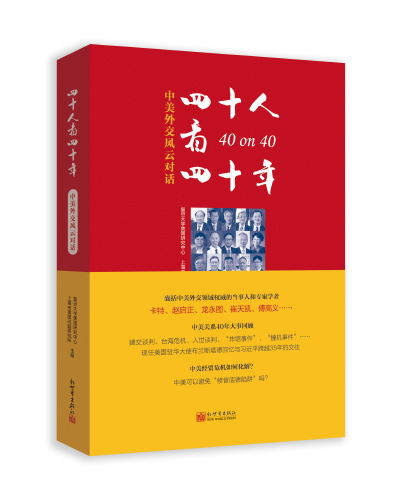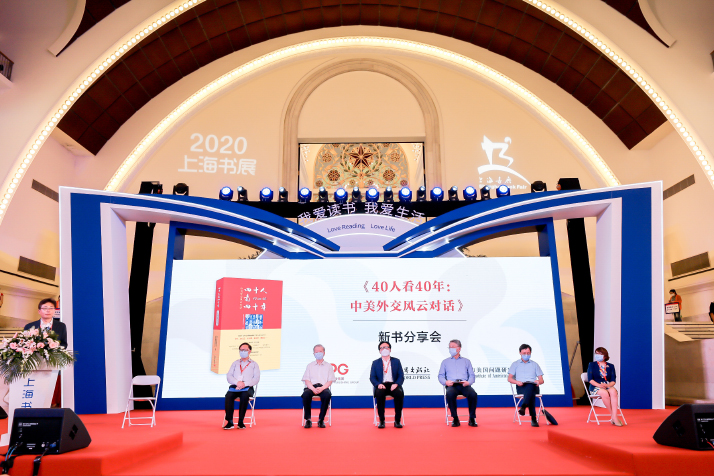| Lifestyle |
| Book puts Sino-U.S. ties in perspective | |
|
|
 The Chinese edition of 40 on 40: Four Decades of Evolving Sino-American Relation. The English edition is in the pipeline (COURTESY PHOTO)
When young American scholar Ezra Vogel winded up his stay in Japan, where he had been studying Japanese and doing post-doctoral research on modern Japanese society, and returned to Harvard University in 1960, he didn't foresee that six decades later, his expanded research would see him become part of a new chapter. After his return to the U.S., Vogel began to research Chinese history, society and economy, learn Chinese and interact with the Chinese. His thoughts on China from those days are now part of a project commemorating 40 years of the establishment of diplomatic relations between China and the U.S. on January 1, 2019. 40 on 40: An Interview Series Commemorating the 40th Anniversary of China-U.S. Diplomatic Normalization was compiled by Shanghai-based Fudan University's Center for American Studies and Shanghai Institute of American Studies with ThePaper.cn, a digital media. It presents insights from 40 experts on the bilateral relationship, often described as the most important bilateral relationship in the world. The pool of experts comprises 20 from each country, with such renowned names as former U.S. President Jimmy Carter and Chinese Ambassador to the U.S. Cui Tiankai. In December 2019, the interviews were published as 40 on 40: Four Decades of Evolving Sino-American Relation by New World Press, a subsidiary of China International Publishing Group, in Chinese. The English version is in the pipeline. "Reviewing milestones and crises, the experience gained in the past can become lessons for the development of China-U.S. relations," Li Chunkai, President of New World Press, told Beijing Review. "We hope the book can present rational insights to readers in different fields to understand Sino-U.S. relations correctly."  A session at the 2020 Shanghai Book Fair on August 12 on 40 on 40: Four Decades of Evolving Sino-American Relation, a book on China-U.S. diplomacy published by New World Press in December 2019 (COURTESY PHOTO)
Witnessing history Vogel, in addition to his research on China, served as a national intelligence officer for East Asia at the National Intelligence Council in Washington and played a positive role in promoting communication between the two countries in academic and diplomatic fields. When Richard Nixon took office as the U.S. president in 1969, Vogel wrote a letter with other scholars, suggesting the president increase exchanges with China. Besides academic activities, he hoped that the two countries could become friends with mutual understanding for world peace. Ten years later, Chinese leader Deng Xiaoping paid a historic visit to the U.S. and Vogel attended some of his meetings. "We believed this was a very important visit," Vogel says during the interview. "It signaled the normalization of our bilateral relations... We did not have official relations until then," adding that after the establishment of the diplomatic relations, more contacts and exchanges in business, academic and diplomatic fields began to grow. After retiring in 2000, Vogel started to work on his biography of Deng, Deng Xiaoping and the Transformation of China, which would take him 10 years to write. At an event organized by the Sino-American Friendship Association, he met Deng Rong, Deng Xiaoping's daughter, and other high-level figures, and developed connections for his research.  Xuzhou Construction Machinery Group, a Chinese construction machinery enterprise, participates in an expo in Las Vegas, Nevada, the U.S., on March 11 (XINHUA)
A new bestseller The New World Press promoted 40 on 40 at the 2020 Shanghai Book Fair last month, and Li said it has become one of his company's bestsellers. "The personal experiences of the interviewees are undoubtedly the best part of the book," a reader commented on Douban, an information-sharing platform. "Forty years ago, China and the U.S. broke through obstacles, overcame differences and worked together. That changed not only the world but also the destinies and aspirations of countless Chinese and U.S. people," Wu Xinbo, head of the Fudan University's Center for American Studies and one of the interviewees, wrote in the preface to the book. Wu has chaired the annual U.S.-China Diplomatic Dialogue, organized by the center and Manchester China Institute, since 2007. The dialogue, a platform founded in 2007 for informal exchanges between young Chinese and U.S. diplomats, seeks to generate mutual trust and foster Sino-U.S. relations, and is supported by China's Ministry of Foreign Affairs and United States Department of State. He found the two countries have a lot in common. However, he has also noted the "rare decline" in the ties in the past 40 years—the U.S. clampdown on Chinese telecom company Huawei, the animosity and allegations in the wake of the novel coronavirus disease and other issues. But despite the trade tensions, David Dollar, a senior fellow in the John L. Thornton China Center at the Brookings Institution, pointed out in his interview that there is fantastic cooperation between China and the U.S. "You have all kinds of scientific cooperation that are rising. And there is a lot of enthusiasm for that kind of cooperation," he said in the interviews. "That is very important for our future relationships, for developing new technologies and approaches to controlling disease." For Zhao Qizheng, former Director of the State Council Information Office and also the first interviewee in the project, conflicts are not insurmountable, especially as China always respects and accommodates others' development interests. "Countries as big as China and the U.S. are bound to have conflicts. These need to be attended to through dialogue and by making compromises and respecting each other's interests. It is a process that cannot be avoided," he said. "China's foreign policy is not meant to be achieved at the expense of other countries. The Chinese dream is not a selfish one." Cui also acknowledged that there are always diverging opinions in the U.S. on U.S. foreign policy. Especially in recent years, there have been some extreme views that, to a large degree, have affected the policy on China, with some even propagating the idea of a new cold war. But although people have the right to express their opinions, these opinions may not necessarily be in line with the world's trend, he said. "There are challenges for all of us in the world. Therefore it is more imperative for countries to cooperate. This is what defines today's world and our future." (Printed Edition Title: The Past Is The Future) Copyedited by Sudeshna Sarkar Comments to liqing@bjreview.com |
|
||||||||||||||||||||||||||||
|
